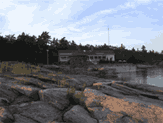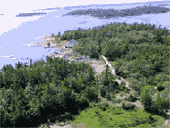|
"Sixth Great Lake"
Georgian Bay has been named the "Sixth Great Lake",
and would be if the land had formed differently and the
Bruce Peninsula had extended all the way to Manitoulin Island.
It is almost as large as Lake Ontario. When viewed on a
map it appears large enough to be a major lake in its own
right. The islands of Georgian Bay are part of the Precambrian
shield, the oldest rocks in the world. Cruising the aged
and barren islands with windswept pines serves as a historical
tour through time.
There are approximately 30, 000 islands across the north
and east coasts of Georgian Bay. Created during the great
ice age, over 1 million years ago, the glaciers swept down
from the north digging and scraping the rock and soil into
southern Ontario and the Northern United States. This glacial
movement created the Georgian Bay and along with it the
30,000 islands.
Boaters Paradise
It’s paradise for boaters during the summer months
on Georgian Bay. Its sparkling waters attract cottagers,
divers, anglers, sailors and vacationers alike. One of the
greatest sailing and cruising areas of the world are located
on the eastern shores of the Bay. Georgian Bay is considered
among the great sailing waters in the world and on good
breezy days all manner of sailing craft from wind surfers
to three-masted schooners.
Canadian Shield
The Town of Parry Sound lies in the heart of the famous
30,000 Islands. It is surrounded by the beauty of Georgian
Bay and the rugged pink granite of the Canadian Shield,
with its forests, lakes and streams. Parry Sound Area is
a four seasons vacation destination with excellent waterfront
facilities for boating, fishing and cruise boating.
For more than 100 years as their summer hunting and fishing
ground, the Huron First Nations used the Parry Sound area
as a "holiday land". The Ojibway First Nations
established a village at the mouth of the Seguin River.
They called their village "Wausakwasene" which
loosely translated means "shining shore." Parry
Sound, the largest town in the area, was incorporated on
April 23, 1887.
 |
Tourism Industry
The steamers were the first lifelines of the settlements,
bringing tourists and homesteaders to the area. The first
railway into the area, The Canadian Atlantic Railway, reached
Rose Point in the early 1900s. With the end of lumbering,
the Parry Sound Area turned its attention to the tourism
industry. Luxury hotels had begun to flourish in the area
which even when the guests had to arrive by stagecoach and
boat. The natural beauty of the unspoiled wilderness and
the hospitality of the inhabitants resulted in a thriving
tourist industry which has continued to grow to the present.
When you browse your way through the many shops that line
the main street, you will discover distinctive galleries
and experience the unique flavor of the local artisans.
Georgian Bay Name
Georgian Bay was charted by Captain Henry W. Bayfield of
the Royal Navy in 1822, he named the area after King George
IV. The area of Georgian Bay located in the District of
Muskoka was formed on January 1st, 1971 due to the amalgamation
of several regional governments. The District of Muskoka
portion of Georgian Bay includes many of the tens of thousands
of islands that dot the uneven shoreline. In 1991 there
were 2,069 permanent residence and 14,238 seasonal.
 |
Imagine being in a position to choose virtually any island
in Sans Souci at the turn of the 20th century! In 1902 a
railroad Baron from Cleveland purchased Somerset Island
from the Crown as it was one of the grand islands of the
area. One hundred years later, it remains eminently clear
why he made Somerset his choice. Comprising more than 20
acres, with two natural harbours, densely covered in original
growth white pine and a completely unobstructed view to
the west.
Comprising a total of 20 acres, Somerset is actually two
distinct sections of land joined by a low lying rock cleft.
The island’s present zoning designation of R2 would
allow for a severance essentially creating roughly a 12
and an 8 acre parcel.
|

